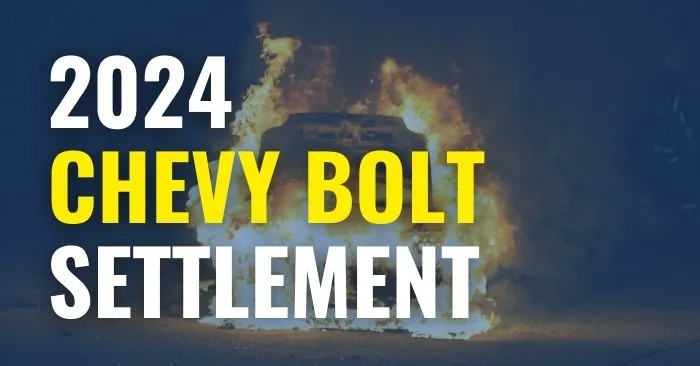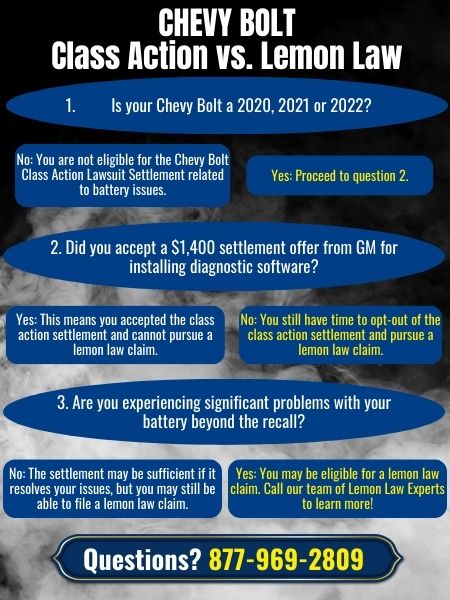Legally reviewed by: Jessica Anvar Stotz, JD, MBA
After two major recalls related to fire risks, Chevrolet announced that it would repurchase or “buy back” certain 2017-2019 model year Chevrolet Bolt EV vehicles. The auto company has already spent well over $800 million in costs related to the Bolt fire recalls. Currently, Chevrolet is responding to buyback requests from customers on a case-by-case basis.
If you own a Chevy Bolt, you should review your legal options as soon as possible. At least 12 car fires have been officially linked to manufacturing defects in certain 2017-2018 Bolt cars. It is extremely dangerous to own a vehicle that can potentially catch on fire at any time.
In February 2024, the manufacturer announced a potential settlement for a class action lawsuit concerning battery defects in 2020-2022 Chevrolet Bolt vehicles. General Motors is urging them to accept a mere fraction of their entitlement— in the form of a $1,400 Visa gift card payment. While the opt-out date is yet to be disclosed, it is expected to be announced in the coming months.
| Settlement Details | Value |
| Affected Vehicles | 2020 – 2022 model year Chevrolet Bolt EV and EUV vehicles involved in GM safety recall N212345944. |
| Notification Letters to Owners | October 23, 2023 |
| Opt-out Date | To Be Announced |

Chevrolet may be generous enough to offer you a VISA gift card for your troubles… however, please know that you may have bigger and better options for recourse, such as an induvial claim. A successful lemon law claim can potentially secure you cash compensation far surpassing $1,400, a replacement vehicle, or a full lemon law refund.
To file a lemon law claim, we recommend enlisting the assistance of a reputable lemon law attorney in your state who can both protect and advocate for your consumer rights.
How Does a “Buyback” Work?
A buyback or repurchase occurs when the auto manufacturer agrees to reimburse you for the money you spent on your defective vehicle. The manufacturer is permitted to deduct a usage fee for when the vehicle was driven trouble-free.
You may be eligible for a Lemon Law Buyback under the California Lemon Law if your car develops issues during the warranty period and the manufacturer is unable to correct your car’s issues after a reasonable number of repair attempts.
If your vehicle does not satisfy the legal requirements to be considered a “lemon,” you may still be eligible for cash compensation covering the diminished value of your car. In these cases, manufacturers offer what are known as “cash and keep” settlements. If your vehicle is legally determined to be a lemon, then you could be eligible to receive a replacement vehicle or a lemon law buyback.
Can I Calculate My Bolt Buyback Price?
It is possible to estimate what you could receive in a Chevy Bolt EV buyback. You can use our Lemon Law Refund/Buyback Calculator to help you determine what you could receive through a buyback agreement. You can begin by clicking HERE.
Your lemon law refund is based on:
- Down payment
- Monthly payments
- Remaining loan balance
- Any out-of-pocket incidental expenses related to the lemon
These same terms apply if you are leasing your vehicle, with your lease obligations being paid off instead of a remaining loan balance. Our Buyback calculator takes this information into account to give you an estimated price for your Lemon Law Buyback or Repurchase.
Please note that our refund calculator neither guarantees nor predicts future outcomes. Each lemon law case is different and must be reviewed individually with the assistance of a highly skilled lemon law attorney. Additionally, this calculator does not include the expense of hiring a lemon law attorney.
How Long Does a Buyback take?
This largely depends on the unique facts in your case. Some cases can be quick and only take 4-6 months to resolve while others can take over 1 to 2+ years to resolve. This answer really depends on the specific circumstances surrounding each individual lemon law claim. Once a lemon law repurchase is offered and accepted, however, the remaining time on the case is a lot faster.
This process of surrendering the vehicle usually takes about 45 to 60 days.
Is This Buyback Time Sensitive?
Yes, California’s Statute of Limitations for Lemon Law Repurchases is four years, meaning that you have four years from the date in which lemon problems appeared in your vehicle to file a claim.
You should file your claim as soon as possible in order to avoid any potential statute of limitations issues.
What Is the Chevy Bolt EV Fire Issue and How Do You Fix It?
The primary function of an electric vehicle or EV’s battery management system is to prevent the spread of overheating from one cell to the entire pack. The initial safety measure involves producing nearly flawless cells, followed by the detection and isolation of problematic cells and modules as the second layer of protection. In the case of the Chevy Bolt, both safety layers failed on numerous occasions.
A General Motors (GM) spokesperson told Autoweek that the Bolt EV lacks the design feature to disconnect individual battery cells. Instead, GM relies on in-vehicle monitors, factory build data, and customer-use data to identify abnormal behavior. In the event of such occurrences, the vehicle’s control system can intervene by limiting the entire battery pack to the capacity of the lowest-performing cell.
In a service bulletin issued to Chevrolet dealerships, the manufacturer included the following instructions to technicians on how to return a Chevy Bolt vehicle to 100% Charging:
- “Set Target Charge Level to 100%. To change the Target Charge Level in the center infotainment display, touch Energy and then touch Charging.
- Touch the Target Charge Level tab on the Charging screen.
- Touch “+” (plus) to increase charge level to 100%.
- If the customer is not waiting, charge the vehicle to full capacity. The charge is complete when the green light on the top of the dash is solid green. DC Fast Charging may be used.”
How does the 2024 Chevy Bolt EV compensation program work?
Upon installation of the final advanced diagnostic software as part of the original battery recall, GM is introducing a compensation program for 2020-22 Bolt EV/EUV owners. Eligible owners in the US can receive a $1,400 Visa eReward card upon installation. Please note that this compensation program solely pertains to owners affected by recall N212345944.
To qualify for this early payment, however, you must have installed the “software final remedy” before December 31, 2023, and have signed a legal release associated with receiving the payment. Failure to do so means that you will have to await the resolution of the class action lawsuit.
Any individual who purchased or leased a vehicle subject to the Bolt battery recalls, excluding for resale, is part of the putative settlement class and can participate unless they opt out. Final approved settlement payments will be distributed to class members through the court settlement process. Customer letters containing instructions on how to claim compensation were issued on October 20, 2023.
If the class action settlement exceeds $1,400, GM says that the difference will still be disbursed to owners who avail of this early compensation offer. With today’s prices, $1,400 is not even enough to cover some minor vehicle repairs, much less damage from a battery fire- making this deal a complete rip-off for consumers. Further details about GM’s offer can be found here. You can read more about GM’s offer here.

Should I File a Lemon Law Claim or Wait for the Class Action Settlement?
While you can wait for your share of the class action settlement, we strongly advise enlisting the services of an attorney to handle your individual lemon law claim. A lemon law attorney can evaluate your case comprehensively and work towards securing the optimal resolution.
This will ensure a better outcome than waiting for a settlement which will likely result in you receiving only a fraction of what you deserve. From experience in our own firm, we consistently achieve settlements that provide Chevy Bolt owners with compensation exceeding 100% of what GM is currently offering.
Please bear in mind that battery issues have affected Chevy EV vehicles manufactured between 2017 and 2024. The manufacturer’s recent settlement offerings have primarily targeted vehicles manufactured after 2020. Earlier this year, GM announced the cessation of battery replacements for 2020 – 2022 Chevy Bolt models.
Instead, they will install a software patch reducing battery charging capacity to 80% for 6,200 miles. Many Bolt owners may need years to accumulate the necessary mileage to assess the effectiveness of the software patch. If your Chevy falls outside the settlement range, pursuing an individual lemon law claim may be your greatest and only recourse.
As a prevailing party, the auto manufacturer pays for your attorney fees and costs. Thus, there is no out-of-pocket expense for you to hire an attorney, which makes this an easy and smart choice. The California Lemon Law is nuanced and needs to be applied specifically to each individual case. Having a knowledgeable lemon law attorney to represent your interests can make the process a lot easier for you.
While the specific opt-out date for the latest settlement is pending, our team stands ready to assist you in timely opting out once the deadline is confirmed. This will ensure that you retain the freedom to pursue your individual claim against GM.
Work with the Chevy Lemon Law Experts
If you decide to file an individual claim, you will need the assistance of an experienced lemon lawyer in your area. If you live in California and have questions about a lemon you have recently leased or purchased, you have come to the right place. The Lemon Law Experts have been successful in securing Chevy Bolt EVs repurchases for California clients with zero out-of-pocket costs to them.
We can review your case and help give you a better idea of what you could receive in financial compensation for your Chevy lemon.
Our team has helped thousands of California consumers recover millions for their lemon law claims, as the state’s leading lemon law firm. We are more than well-equipped to help you get the compensation and justice you deserve. To find out if you qualify, give us a call at 887-885-5366 or fill out an online case evaluation today.




